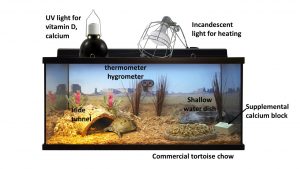Your pet’s health depends on a healthy environment and proper nutrition. Diet should be similar in nature and nutritional content to the foods consumed in the wild.
The natural diets of herp species are as varied as the habitats they occupy. Snakes are carnivorous and many popular pet species can be fed a rodent diet. Many amphibians eat insects and commercially available crickets or worms will comprise the bulk of their meals. Land-dwelling tortoises need a high fiber, low protein diet, and pet owners need to provide fresh vegetables or

grasses, depending on the species. Artificial diets have been developed for reptiles to provide important nutrients. However, many herps will require a combination of live and artificial foods including mineral and vitamin supplements for complete nutrition.
Adequate calcium is critical for reptile health, and live crickets are commonly dusted with a powder containing vitamins and calcium before feeding. Another means to a balanced diet is “gut-loading”: feeding crickets with sources of important nutrients for your pet.
Fresh, non-chlorinated water is important for all herps. If your water is from a municipal source, use an additive to remove the chlorine. Aquatic species need a permanent water feature, while other species need only a water dish to soak occasionally. Shallow water dishes are a must for tortoises that cannot swim. Water quality is particularly important for aquatic turtles, and aeration is a good feature to add to the tank.
Water bowls must be cleaned and re-filled regularly; many pet herps will defecate in their water bowls. For aquatic species, water and substrate should be replaced every week or so, more often if soiled with feces or urates. Periodically, the entire enclosure should be cleaned and disinfected (a 5% bleach solution is a common disinfectant); thoroughly rinse the enclosure before returning your pet.
In most cases, well-maintained habitat along with proper diet will keep your pet free from illness. Changes in behavior or appearance may be a sign of disease.